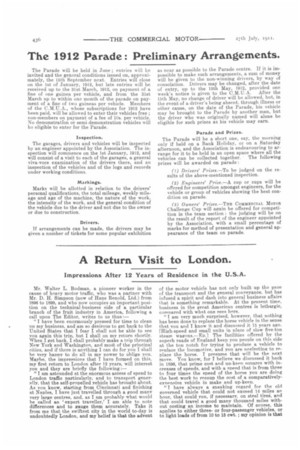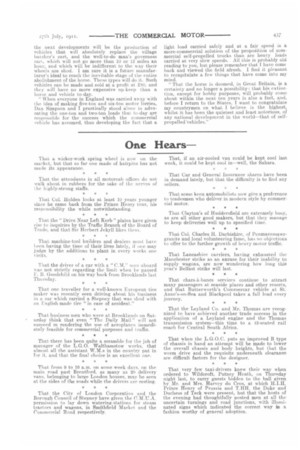A Return Visit to London.
Page 2

Page 3

If you've noticed an error in this article please click here to report it so we can fix it.
Impressions After 12 Years of Residence in the U.S.A.
Mr. Walter L. Bodman. a pioneer worker in the cause of heavy motor traffic, who was a partner with Mr. D. H. Simpson (now of Hans Renold, Ltd.) from 1896 to 1899, and who now occupies an important position on the technical-business side of a particular branch of the fruit industry in America, following a call upon The Editor, write.s to us thus :— " I have been enormously pressed for time to clean lin my business, and am so desirous to get back to the United States that I fear I shall not be able to see you again this trio, but I shall on my return shortly. When I get back. I shall probably make a trip through New York and Washington, and mat of the principal cities, and if there is anything I can do for you I shall he very happy to do all in my power to oblige you. Maybe, the impressions that I have formed on this. my first return to London after 12 years, will interest you and they are briefly the following:— " I am astounded at the enormous access of speed to London traffic particularly, and to transport generally, that the self-propelled vehicle has brought about. As you know, starting from Cincinnati and finishing at Naples, I have just travelled through a good many very large centres, and, as I am probably what would he called an 'expert traveller,' I am able to note differences and to gauge them accurately. Take it from me that the swiftest city in the world to-day is undoubtedly London, and my belief is that the advent of the motor vehicle has not only built up the pace of the transport and the general conveyance, but has infused a spirit and dash into general business affairs that is something remarkable. At the present time, business in the great American centres is lethargic, comnared with what one sees here.
"I am very much surprised, however, that nothing has been done to replace the horse vehicle in the sense that you and I know it and discussed it 15 years ago. IHigh-speed and small units in place of slow five-ton steam wagons.—En.1 The facilities offered by the superb roads of England keep you people on this side at the ton notch for trying to produce a vehicle to replace the locomotive, and you are neglecting to replace the horse. I presume that will be the next move. You know, for I believe we discussed it back in 1896. that prime cost and un-keen sauares with increases of speeds, and with a sueed that is from three to four times the speed of the horse you are doing the best work to recoup the cost of a comparativelyexnensive vehicle in make and up-keen.
"I have always a sneaking regard for the old governed vehicle that could not exceed 14 miles an hour, that could run, if necessary, on steel tires, and that could travel a good many thousand miles without costing an income to maintain. Of course, this applies to either threeor four-passenger vehicles, or to light loads of from 10 to 15 cwt. ; my opinion is that the next developments will be the production of vehicles that will absolutely replace the village butcher's cart, and the well-to-do man's governess cart, which will not go more than 10 or 12 miles an hour, and which will be indifferent to the way their wheels are shod. I am sure it is a future manufacturer's ideal to reach the inevitable stage of the entire abolishment of the horse. These types will do it. Such vehicles can be made and sold at a profit at £80, and they will have no more expensive up-keep than a horse and vehicle to-day.
" When everyone in England was carried away with the idea of making five-ton and six-ton motor lorries, Dan Simpson and I practically stood alone in advocating the one-ton and two-ton loads that to-day are responsible for the success which the commercial vehicle has assumed, thus developing the fact that a
light load carried safely and at a fair speed is a. more-commercial solution of the propoiilion of commercial self-propelled trucks than are heavy loads carried at very slow speeds. All this is probably old reading to you, but please remember that I have com( back and viewed the field afresh. I find it pleasant to recapitulate a few things that have come into my mind.
"That the horse is doomed, in Great Britain, is a certainty and no longer a possibility: that his extinction, except for hobby purposes, will probably come about within the next ten years is also a fact, and, before I return to the States, I want to congratulate my countrymen on what I believe is the highest, whilst it has been the quietest and least notorious, of any national development in the world—that of selfpropeller! 'vehicles."




















